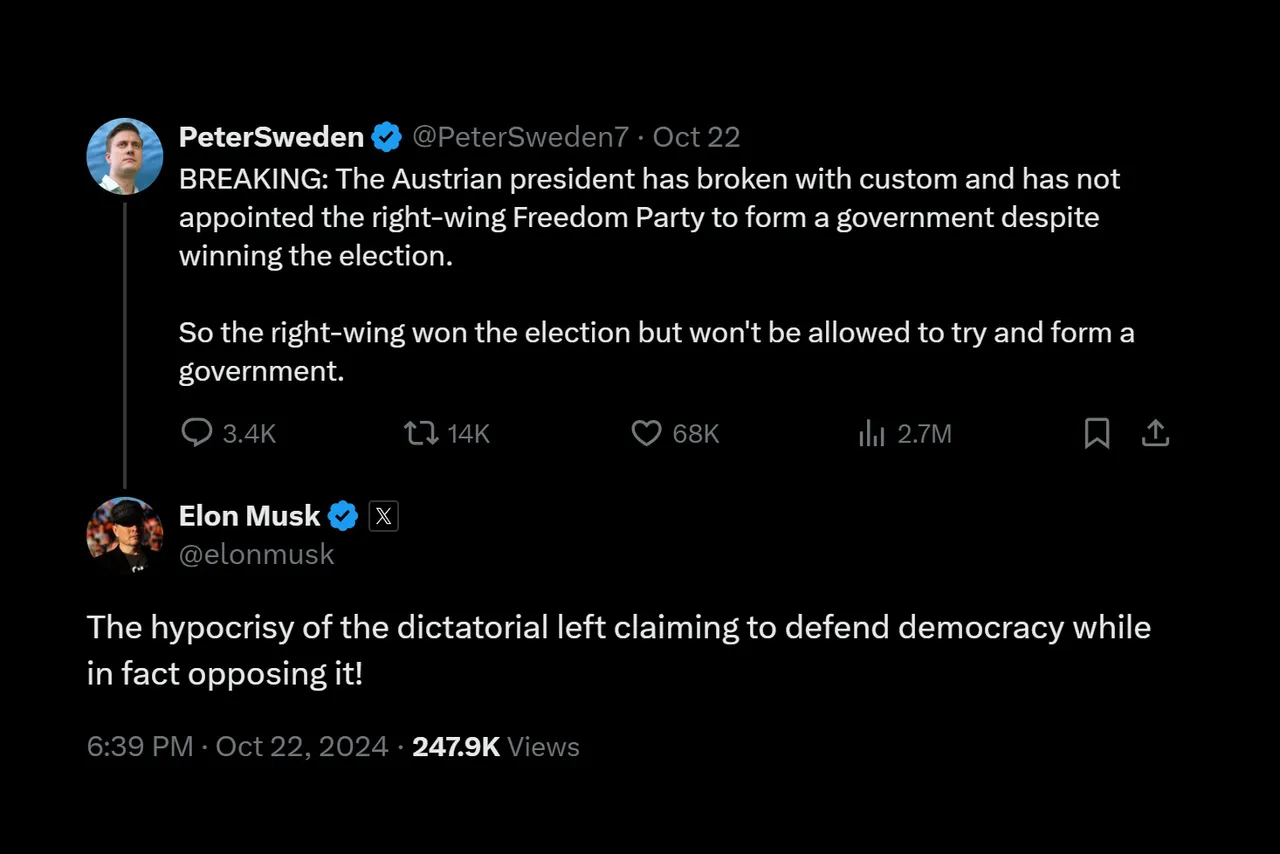Elon Musk hat die österreichischen Wahlen kommentiert, wie die "Linke" (gegen rechts) der Partei und dem Wahlsieger (FPÖ) nicht erlaubt hat, eine Regierung zu bilden.
Der Bundespräsident hat seine Entscheidung wie folgt argumentiert, mit der FPÖ würde sowieso keine Partei koallieren wollen und deswegen überspringt er sie gleich und bittet die beiden Wahlverlierer eine Koalition zu bilden.
Weiters führt der Bundespräsident auch erstmals ideologische Argumente an, die gegen eine Regierungsbildung der FPÖ sprechen. Gründe seien eine "unmögliche Zusammenarbeit" mit Kickl (dem Parteivorsitzenden der FPÖ), die Sorge um die "liberale" Demokratie, die Russlandpolitik, spaltende und hasserfüllte Sprache, ein rückwärtsgewandtes Frauenbild und viele andere Bedenken.
Usus der letzten Jahrzehnte war allerdings immer, die Parteien in der Reihung ihrer Ergebnisse mit der Regierungsbildung zu beauftragen. Würde der Erstplatzierte scheitern, würde der Zweitplatzierte den Regierungsauftrag bekommen und so weiter, bis eine Koalition gebildet wird oder wenn keine mehr möglich ist, dann würde es zu Neuwahlen kommen.
Es stimmt, dass der Bundespräsident zu dieser Reihung nicht verpflichtet ist, aber diese Praxis ist meines Wissens nach auf der ganzen Welt in Demokratien aus gutem Grund Usus.
Andererseits hat er teilweise Recht, dass im Moment mit den derzeitigen Parteivorsitzenden der anderen Parteien keine Koaltion mit der FPÖ möglich ist. Aber denkbar wäre durchaus ein fliegender Wechsel der Parteivorsitzenden und dann würde die Sache wieder anders aussehen.
Deswegen denke ich, egal ob man die FPÖ mag oder nicht, sollte sie als Wahlsieger zumindest den Regierungsbildungsauftrag erhalten. Sollte sie damit scheitern, kann sie dann auch nicht mehr dem Bundespräsidenten die Schuld dafür geben.
Jetzt sieht es aber so aus, als hätte der Bundespräsident undemokratisch gehandelt und eine demokratisch legitimierte Protest-Partei, die die Wahl gewonnen hat, von vornherein ausgeschlossen. Aus ideologischen Gründen.
Was sagt ihr dazu? Findet ihr die Entscheidung des Bundespräsidenten undemokratisch oder kann man sie irgendwie rechtfertigen?
Elon Musk commented on the Austrian elections

https://x.com/elonmusk/status/1848766046209196419
English
Elon Musk has commented on the Austrian elections, how the “left” did not allow the right-wing party and the election winner (FPÖ) to form a government in Austria (Europe).
The Federal President argued his decision as follows: no party would want to form a coalition with the FPÖ anyway, so he skipped them and asked the two election losers to form a coalition instead.
Furthermore, the Federal President also cites ideological arguments against the FPÖ forming a government for the first time. The reasons were “impossible cooperation” with Kickl (the FPÖ party leader), concerns about “liberal” democracy, their Russia policy, divisive and hateful language, a backward-looking image of women and many other concerns.
In recent decades, however, it has always been customary for parties to form a government in the order of their results. If the first-placed party failed, the second-placed party would be given the government mandate and so on until a coalition was formed or, if none was possible, new elections would be held.
It is true that the Federal President is not obliged to do adhere to this practice, but as far as I know this practice is common in democracies all over the world for good reasons.
On the other hand, he is partly right that a coalition with the FPÖ is not possible at the moment with the current leaders of the other parties. But a change of party leaders on the fly would be conceivable and then things would look very different again.
That's why I think, regardless of whether you like the protest party FPÖ or not, as the winner of the election it should at least be given the mandate to form a government. If they fail, they can no longer blame the Federal President.
But now it looks as if the Federal President has acted undemocratically and excluded a democratically legitimized protest party that won the election from the outset. For ideological reasons.
What do you think? Do you think the Austrian President's decision is undemocratic or can it be justified in some way?